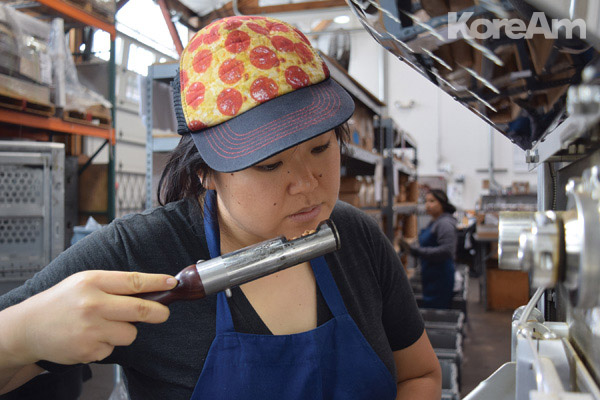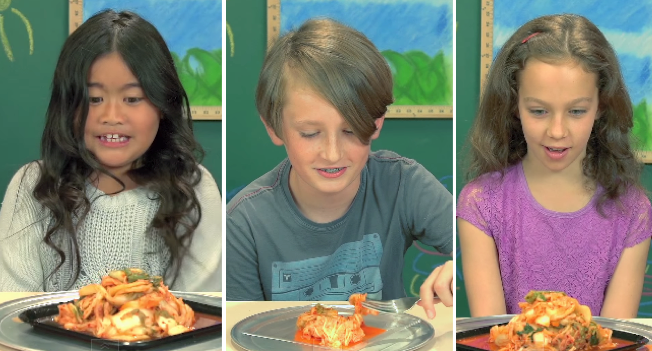story and photography by JANE KIM
Coffee consumption in the U.S. has come a long way since the days of round tins and jingles that begin, “The best part of wakin’ up… .” Beyond the growth of chains such as Starbucks, the latest wave of the coffee trend is a rise in local and artisanal shops using responsibly sourced beans and fresh-roasting their coffee, leading sippers and slurpers to talk fruits and floral notes.
As diverse as the fans of this “third-wave” coffee scene may be, there still is room to grow when it comes to the range of folks behind the counter. On the production floor of burgeoning specialty coffee companies, female and minority roasters are hard to find.
Enter Juliet Han.
 KoreAm recently traveled to the Blue Bottle Coffee headquarters in Oakland, Calif., to meet with Han, a roaster for one of the fastest-growing and most religiously sought-after third-wave coffee labels. Based in the Bay Area but with locations in New York, Los Angeles and Tokyo, Blue Bottle focuses on signature blends and single-origin beans and is known for its attention to coffee purity, brewing each cup manually.
KoreAm recently traveled to the Blue Bottle Coffee headquarters in Oakland, Calif., to meet with Han, a roaster for one of the fastest-growing and most religiously sought-after third-wave coffee labels. Based in the Bay Area but with locations in New York, Los Angeles and Tokyo, Blue Bottle focuses on signature blends and single-origin beans and is known for its attention to coffee purity, brewing each cup manually.
Having worked in the coffee industry for over a decade, Han, 33, has a few notches in her belt. She is a certified “Q Grader,” loosely considered the coffee equivalent of a wine sommelier. She has judged regional barista competitions and placed third in the 2012 U.S. Cup Tasters Championship, representing Intelligentsia Coffee.
After graduating from the University of California, San Diego, Han took up musicians’ rights and headed to Washington, D.C., for a music policy internship—which explains the darling treble clef inked on her wrist. Music eventually led to coffee, and coffee took her to Chicago, Vermont and back to California. All business in her pepperoni pizza print work cap when we visited, Han explained how these experiences refined her palate and put her on the path to becoming a coffee roaster. The conversation has been edited for length and clarity.
What does a coffee roaster do exactly?
Juliet Han: As a roaster, it is super important that we taste the coffees we are making—it’s the only way to understand how to roast the coffee. When we roast, we’re using all our senses; I especially use my nose. The way a coffee smells while it’s roasting will help explain what it might taste like. At Blue Bottle, we “cup” (Editor’s note: lingo for the procedure used to detect taste and aroma) most of our roasts, six days a week. We cup the coffees with each roast—separately, and then together as a blend. This helps me to direct the other roasters on any changes we have to make. The coffees are always changing as well, from the size of a batch we roast, to the way it changes with time. It all depends on the season as well. We forget coffee is a raw product. We want characteristics of that country to really shine in the coffee. I get to help make all of this happen.
What’s it like working at Blue Bottle?
Blue Bottle is a really fun, challenging place to roast coffee, in all of my experiences. We have one of the widest menus and coffees from all over the world, with different varietals. We aim for deliciousness; we don’t say no to a certain country, or a certain way a coffee is processed. We have two machines—one vintage, one state-of-the-art technology. Every day is different and new.

Were you always into coffee?
I was in college when I took a night job. I grew up drinking soda, and coffee was the next sophisticated thing to do in college. It was disgusting. I would drink white mochas and add sugar. That’s how I started.
You worked as a barista at Murky Coffee in Washington, D.C., and then Intelligentsia Coffee in Chicago for a number of years before deciding to roast. What inspired the switch?
I first applied to be a roaster at Intelligentsia, but didn’t get the gig. The guy who interviewed me said, “You’re passionate about coffee. You have a great work ethic. But you just couldn’t tell me why you wanted this.” He was right—I didn’t know why. I just thought that was the next step. Now, when I think about it, I was on that path anyway, because the one thing I loved about coffee was tasting it.
After the interview, I went to go work in Waterbury, Vermont, where I got real coffee lab experience. I moved out there not even knowing how much I was going to get paid. I called it my “coffee boot camp,” and it was there that I sample-roasted for about three to five hours almost every day. It became my goal to be as consistent as possible. When you’re sample-roasting, you’re intentionally roasting the coffee pretty light, because you want to discover any defects that might be in the raw product.
It’s a challenge because most importers give you a sample of about 200 grams. So if you mess that up, you’re done. You don’t have another chance. That’s where I realized I could be a roaster, and I could own it.
What brought you back to California?
My friend bought a one-way ticket to Vermont. We basically decided to start driving my car, with all my crap in it, to L.A. We got there in four days. It was rough. Then, I started at Intelligentsia in L.A. as a roaster. The guy who interviewed me said, “We realized roasters have to be tasters, too.”
Today, you’ll meet a ton of roasters who have a great palate. They taste everything they do, and if they’re not a fool, they’ll taste everything that they roast.

How gender-diverse is the coffee production industry?
In general, you don’t see many women in coffee production. That said, Blue Bottle employs many women in coffee production. We’re almost equal [in number] to men. I don’t take that for granted, knowing that that [ratio] is exceptional. It’s tough if you don’t have experience and you’re fighting to get it. But, it goes both ways, where I think women are afraid to go for it. I always felt like I had to work harder, because if and when I did make mistakes, people were watching. It’s like a lot of industries where it’s male-dominated. But I was very fortunate to work under amazing women, and that’s not the case for every woman and every man.
What do you love most about what you do?
It just hasn’t gotten old. I love that it’s a moving target. I love that it changes so much. I never stop learning—and I will always want to learn. That’s a huge part of the way I live life. If I like something, it’s not cool to just like it. I want to really learn more about it. That’s what has led me to science. If anyone had told me I would be studying science for coffee— you know, in my thirties—I would have laughed in their face.
See Also
Sidebar: Quick Facts About the Specialty Coffee Market
Starbucks Paper Cups Transformed Into Art
___
This article was published in the June/July 2015 issue of KoreAm. Subscribe today! To purchase a single issue copy of the June/July issue, click the “Buy Now” button below. (U.S. customers only. Expect delivery in 5-7 business days).









